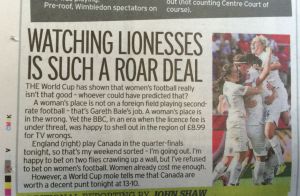I’ve been feeling a wee bit feminist this year. So much so that my A Level students began checking on entering the room whether it was a ‘feminist Nazi’ day. Anyone would think I was force-feeding them Angela Carter and Carol Ann Duffy (both on the syllabus) but by the end of the course, I had them demanding to be allowed to spread the message of equality in school assemblies and identifying themselves as ‘feminist warriors’. Feminist mission achieved!
At the start of the year, I raced through Laura Bate’s ‘Everyday Sexism’ suddenly finding a name for things that had pissed me off in the past without ever really identifying them as sexist, misogynistic and discriminatory. Teachers who would tell boys in Primary school to ‘stop crying like a little girl’ or that time I wrote to the Advertising Standards Agency to complain about an advert that suggested ‘her indoors’ needed to be deceived about a guy going to the pub to secretly watch the football. I suggested that maybe she would actually like to go and watch the football herself rather than stay at home and make his tea but apparently this depiction of modern life was acceptable.
I moved a bit more slowly through Laurie Penny’s ‘Unspeakable Things: Sex, Lies and Revolution’, a provocative read, which focused more on freedom for all, whether that means inventing new gender roles, or the need to give those oppressed by a patriarchy (men included because of the social pressure to behave with a macho masculinity) a voice.
‘All the Rebel Women’ provides a counterpoint to these texts, exploring the Fourth Wave of Feminism and considering recent global events that have shaped this. Issues such as Female Genital Mutilation, the battle over page 3, the fact that a worrying percentage of the Internet is porn and the pressure on young girls and boys to conform to expected gender roles such as unhealthy ideals of beauty and behaviour, are discussed in relation to anecdotal examples, which highlight the relevance of this continued battle.
Growing up, I was aware that I’d been named with a nod and a wink to strong females such as Emily Wilding Davison and Emily Bronte. Davison famously ‘threw herself’ in front of the King’s horse in a dramatic climax to the fight for women’s suffrage. One hundred years later in 2013, historians argued about whether her actions were a deliberate protest or whether she simply slipped at the wrong moment. Embarrassing perhaps, however, having been jailed 9 times and force fed 49 times, I’m not too comfortable questioning her courage and dedication to the movement.
Recent news has focused on the objectification of women in Hollywood with Maggie Gyllenhaal speaking out about the fact that being in her dotage at the age of 37 meant that she was considered to be ‘too old’ to play the love interest of a 55 year old man. The commonplace practice was parodied with expert comedy timing by Amy Schumer in this scene for comedy central. Unapologetic in her honesty, this is the kind of fourth wave feminism that Cochrane identifies as ‘popular and flourishing’. Ridiculing the Hollywood establishment from within certainly seems to be an effective strategy in highlighting this issue.
As Professor Tim Hunt recently found out to his peril, sexism is a hot topic at the moment. Stating the trouble with female scientists as: ‘you fall in love with them, they fall in love with you and when you criticise them, they cry’, he failed to read the prevailing feminist mood leading to his forced resignation. As blogged about by my feminist friend here, this kind of ingrained, perhaps even institutional sexism speaks of a dinosaur mentality when STEM (Science, Technology, Engineering and Mathematics) positions for women, after decades where women were horribly unrepresented in these areas, seem to at last be becoming more equitable.
Sports is another area where sexism is becoming more recognised. Kicking out sexism from football seems to be the discrimination de jour now that football’s governing bodies have been forced to confront racism with some success. Everyone knows what it is, they know it’s not good and they know they shouldn’t be doing it. After Chelsea’s female doctor, Eva Carneiro, was abused with sexist chants during a game, the football club vowed to do something about it. And of course the unprecedented success of the England women’s football team (doing WAY better than their male counterparts) at the recent World Cup, presents far more positive role models for girls growing up and wanting to be involved. Some journalists seemed to struggle with the concept of women achieving anything, let alone in a male dominated arena (see below) but generally there was an extremely positive reaction with the Guardian newspaper reporting prolifically on the tournament.

People are clearly becoming more attuned to potential discrimination. This tweet from the FA was condemned as patronising and sexist:
‘Our #Lionesses go back to being mothers, partners and daughters today, but they have taken on another title – heroes.’
One of the players said it was nice to be called ‘heroes’ and played down the insinuations that they could all go back to their rather more mundane day jobs and being identified in relation to another family member.
Has the backlash gone too far or is it simply, as Cochrane puts it, that ‘in the UK and around the world, millions of women (are) calling for equality and respect, for the right to be treated, essentially, as human beings’ in a far more more vocal and organised way and using social media to do this?
She ends with a warning that seems particularly pertinent for those who have failed to evolve (take note Tim Hunt): ‘Misogynists, you’d better watch out.’
